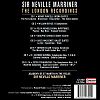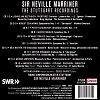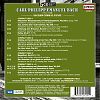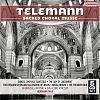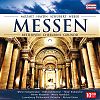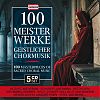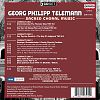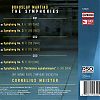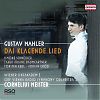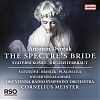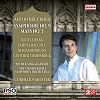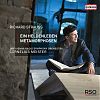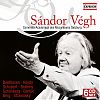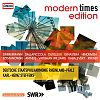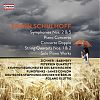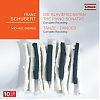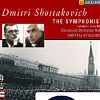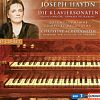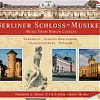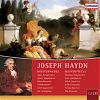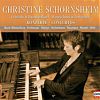box-sets

SIR NEVILLE MARRINER - The London Recordings
ACADEMY OF ST MARTIN IN THE FIELDS
CD 1 HENRY PURCELL: Opera Suites
CD 2 WILLIAM BOYCE: 8 Symphonies
CD 3 FELIX MENDELSSOHN BARTHOLDY: Overtures
CD 4 ADOLPHE CHARLES ADAM Giselle
CD 5 JULES MASSENET: Ballet Suites
CD 6 EDWARD ELGAR: Enigma Variations
The Wand Of Youth Suites Nos. 1 & 2
CD 7+8 ANTONIN DVORAK:
Symphonies Nos. 7, 8 & 9 "From The New World"
Carnival Overture · Othello Overture
CD 9-14 PETER TCHAIKOVSKY:
The Symphonies Nos. 1-6
Manfred Symphony · Capriccio Italien · Overture "1812" · Francesca da Rimini
Neville Marriner was the Academy of St. Martin in the Fields – the orchestra he founded in 1958 and led for over half a century. Moreover, he was the face of classical music to millions of listeners… in a way that only Toscanini, Bernstein, and Karajan have rivalled in the age of recorded sound. In the later years, it was Capriccio, that stepped in when other labels showed no interest to record the Academy in the bigger romantic repertoire. The central element of this collection is the set of Tchaikovsky symphonies."The members of the Academy, trained on quite different repertory, let their hair down in playing that is both crisp and alert, obviously enjoying their outing into this pop repertory." Edward Greenfield, Gramophone
Weitere Bilder

Sir Neville Marriner - The Stuttgart Recordings
RADIO-SINFONIEORCHESTER STUTTGART
CD 1 + 2 LUDWIG VAN BEETHOVEN: Overtures
CD 3 – 5 ROBERT SCHUMANN
Symphonies Nos. 1 – 4 · "Zwickauer" · Manfred Overture
CD 6 – 7 PETER TCHAIKOVSKY: Orchestral Suites 1-4
CD 8 GUSTAV MAHLER: Symphony No. 4
CD 9 – 10 RICHARD STRAUSS
Don Juan · Till Eulenspiegel · Capriccio · Rosenkavalier-Suite
CD 11 SERGE RACHMANINOV: Symphony No. 2· Vocalise
CD 12 BELA BARTOK: Der wunderbare Mandarin
CD 13 BENJAMIN BRITTEN: Sinfonietta op. 1 · Sinfonia da Requiem
ARTHUR HONEGGER: Sinfonie Nr. 3 "Liturgique"
CD 14 GEORGE GERSHWIN
Rhapsody in Blue · Piano Concerto in F · An American In Paris
CD 15 BARBER · COPLAND · GERSHWIN · BERNSTEIN
In Stuttgart, 1983 – 1989,Neville Marriner followed Sergiu Celibidache, offering quite the contrast to that willfully prodigious Romanian broodingly charismatic style with his own easygoing, less spectacular but genial manner and music-making. His sound wasn’t as dense and carefully crafted, but the ensemble’s playing became lighter and flexible, agile rather than probing. It is in his Stuttgart period that Marriner increasingly focused on repertoire that went beyond the baroque and classical periods. This compilation offers repertoire which music lovers will be less likely to associate with Marriner: German romanticism, including all of Schumann’s Symphonies, Richard Strauss, Tchaikovsky and Rachmaninoff, Mahler, Bartók and Gershwin – The fundamental impression that comes from re-listening to these performances, apart from good and fresh music-making, is one of sympatheticmusic-making. That feels about right as an epitaph for the man and his body of work.
Weitere Bilder

CARL PHILIPP EMANUEL BACH: SACRED CHORAL MUSIC
Rheinische Kantorei · Das Kleine Konzert · Hermann Max · La Stagione Frankfurt · Michael Schneider
Klopstocks Morgengesang am Schöpfungsfeste Wq 239 (Leipzig 1784)
Auf, schicke dich recht feierlich Wq 249 (1775)
Anbetung dem Erbarmer Wq 243 (vor/before 1784)
Heilig Wq 217 (1776)
COMPACT DISC 2
Gnädig und barmherzig ist der Herr Wq 250 (1785)
Wer ist so würdig als du Wq 222 (Hamburg 1774)
Der Herr lebet Wq 251
COMPACT DISC 3
Magnificat Wq 215 (1749)
Der Gerechte, ob er gleich zu zeitlich stirbt (H 818)
COMPACT DISC 4 + 5
Die Auferstehung und Himmelfahrt Jesu Wq 240 (1777/78)
The Resurrection and Ascension of Jesus
Gott hat den Herrn auferwecket Wq 244 (1756) "Easter Cantata"
RHEINISCHE KANTOREI · DAS KLEINE KONZERT
HERMANN MAX
DRESDNER KAMMERCHOR · LA STAGIONE
MICHAEL SCHNEIDER (Magnificat)
After the 5CD-Release with sacred choral music by Georg Philipp Telemann (C7215), Capriccio continues now with most impressive Cantatas and Oratorios by Carl Philipp Emanuel Bach. It's already shown that the famoust of the Bach-Sons has nothing to hide compare to his Fathers Masterworks. Since three decades, Hermann Max has been a major contributor to the canon of historically informed performance practice and makes these Rarities alive again.
Weitere Bilder

TELEMANN: Sacred Choral Music
Rheinische Kantorei · Das Kleine Konzert · Hermann Max
Die Donnerode (The Thunder Ode) TWV 6:3
Cantata in 2 parts for 5 solo voices, choir and orchestra
Der Herr ist König (The Lord Is King) TWV 8:6
Cantata for soprano, tenor, bass, choir and orchestra
COMPACT DISC 2
Der Tag des Gerichts / The Day Of Judgment TWV 6:8
COMPACT DISC 3
Danziger Choralkantaten / Danzig Chorale Cantatas
COMPACT DISC 4
Alles redet itzt und singet (Kantate / Cantata TWV 20:10)
Missa brevis TWV 9:14
Deus judicium tuum TWV 7:7 (Motette / Motet)
COMPACT DISC 5
Die Auferstehung und Himmelfahrt Jesu TWV 6:6
The Resurrection and Ascension Of Jesus TWV 6:6
Barbara Schlick · Veronika Winter · Wildfried Jochens · Klaus Mertens
RHEINISCHE KANTOREI · DAS KLEINE KONZERT · HERMANN MAX
"Lulli is given praise, Corelli great acclaim; Telemann alone is above all fame", wrote the music author Johann Mattheson in 1740. Mattheson's claim was quite accurate: the director of music in Hamburg had less need to fight for recognition than ever. His leading role in the musical life of northern and central Germany was undisputed. With this 5CD-Collection Capriccio presents some most important Sacred Music Masterpieces from his early age to the later period. Telemann attempted to give each poem the music that "it could endure": each new "musical poetry" consequently stimulated an attempt at an artistically suitable musical realisation.
Weitere Bilder

BOHUSLAV MARTINŮ: THE SYMPHONIES
CORNELIUS MEISTER
COMPACT DISC 1
[1] – [4] Symphony No. 1, H. 289 (1942)
[5] – [8] Symphony No. 2, H. 295 (1943)
COMPACT DISC 2
[1] – [3] Symphony No. 3, H. 299 (1944)
[4] – [7] Symphony No. 4, H. 305 (1945)
COMPACT DISC 3
[1] – [3] Symphony No. 5, H. 310 (1946)
[4] – [6] Symphony No. 6 „Fantaisies symphoniques“, H. 343 (1954)
Martinu has suffered the fate of not enjoying the same popularity and wide appeal like Bedřich Smetana, Antonín Dvořák und Leoš Janáček on the podium. This often goes so far that his singular skill is referred to, but that the wealth of his oeuvre in all the salient genres is hardly familiar. For decades, Martinů had shied away from composing a symphony. The first one was finally to be written in the USA in 1942, followed by another one every year until 1946 (the sixth was only added to the work catalogue in 1953). For this reason, there is sometimes talk of the ‘American’ symphonies. The symphonies do mirror the events of the time, but at the same time long passages must be regarded as absolute music.


